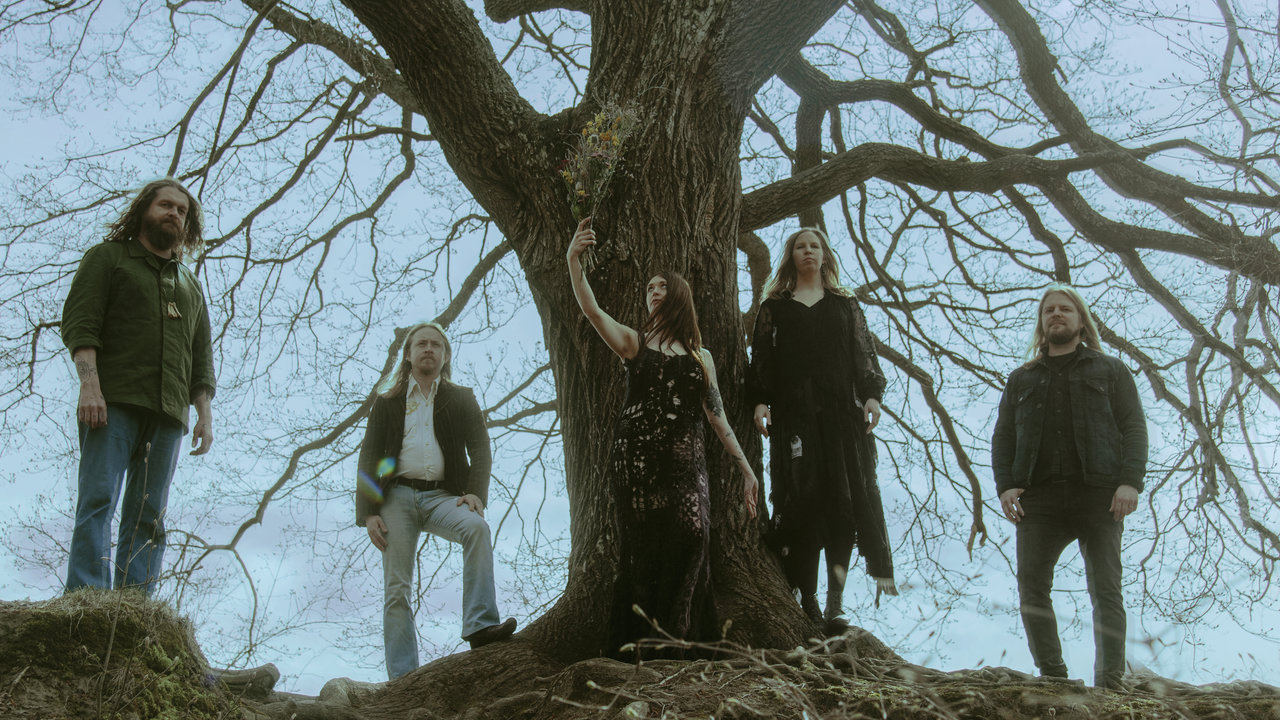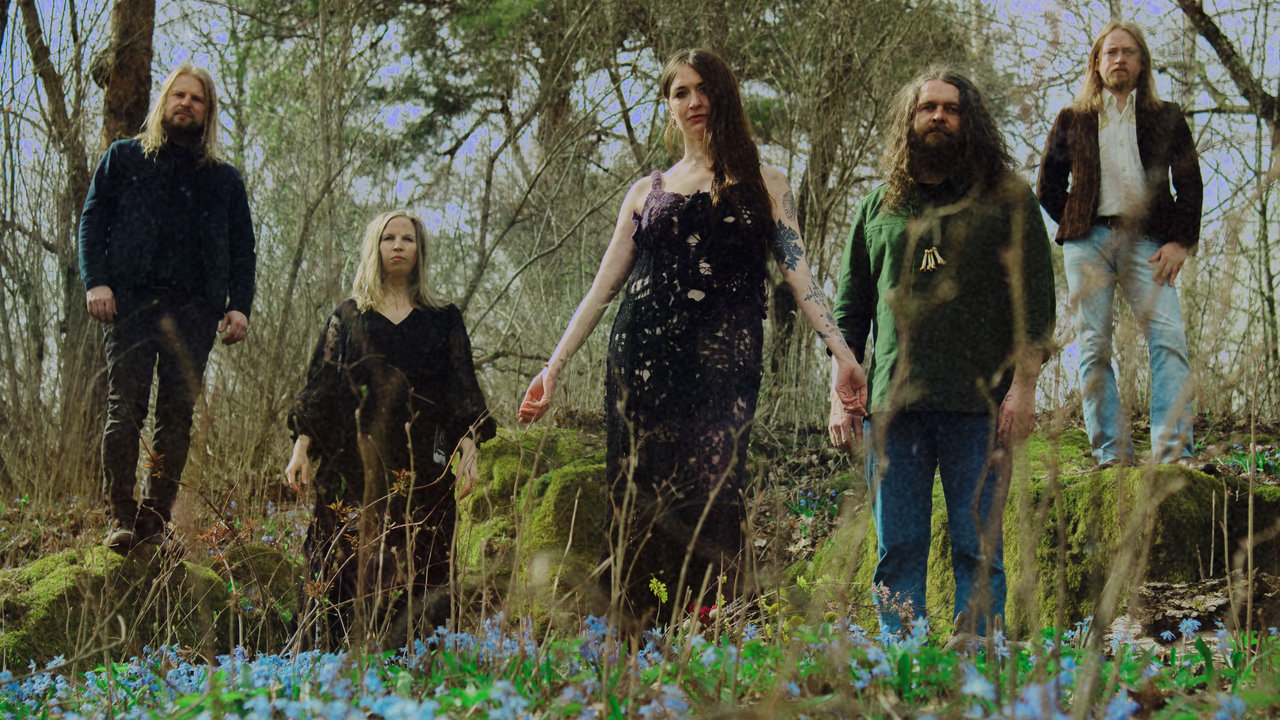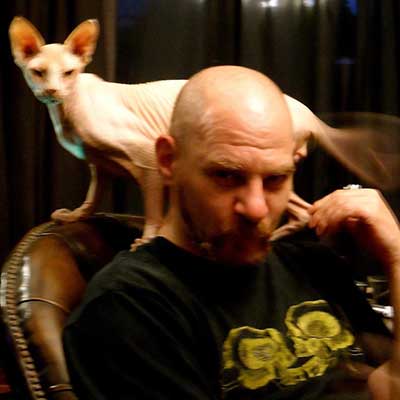Is there any city on the metal map that's more of a cauldron of creativity than Tampere, Finland? Home to cosmonauts and ritualistic rockers such as Oranssi Pazuzu, Dark Buddha Rising, Hexvessel, Vesperith and Death Hawks, it’s been gestating another new and enthralling configuration in the form of pagan folk troupe, Dust Mountain.
Formed by Oranssi Pazuzu bassist Toni Hietamäki and his sister, vocalist Henna, and featuring members of Death Hawks and Hexvessel amongst their ranks, Dust Mountain have been brewing their debut album, Hymns For Wilderness, over the course of five years. What’s emerged is a tapestry of insidiously consciousness-altering incantations, steeped in mystically tuned, tradition-warping early 70s folk acts such as Comus and Linda Perhacs, but with a luxurious bent that belongs, if not to the here and now, then a woozily rapt dream state they’ve made entirely their own.
If you’ve yet to wonder into Dust Mountain’s circle, the band are releasing a new lure with a video for the album track, Under My Spell. As unsettling as it is enticing, the song contains residues of Oranssi Pazuzu’s exploratory, walls-of-reality-nudging groove, but spins on a more pastoral, if off-kilter axis, bordering on the realms of folk horror that’s making a comeback with films such as Midsommar.
The video itself is simple yet mesmerising – a veiled dancer performing rites in a field, shot it grainy, filtered film and with enough time-lapse effects to make your brain undergo a temporal twang or two. Enter the uncanny world of Dust Mountain below, and read further for an interview with the band founders, Toni and Henna Hietamäki.
Dust Mountain had a five-year gestation time before releasing your debut album. How did the band evolve over that period, and what are the benefits of patience?
Toni Hietamäki (bass): “Assembling the band a few years back was pretty straightforward since all the musicians were instantly a good fit, but we have to work in periods, so when Oranssi Pazuzu or Hexvessel are touring it of course means time off for this group.
“We also recorded the album in bits, adding small parts piece by piece. It was definitely a good thing that it took some time before we started recording the album, also because that meant we had a deeper chemistry by then. I had played with Jukka [Rämänen, drummer] and Pauliina [Lindell, guitarist/backing vocalist) earlier with Waste Of Space Orchestra and Vuono, but all the others needed to get to know each other musically. It was a very rewarding feeling when it was finally all recorded and mixed."
Hymns For Wilderness draws from a wide range of British and US folk influences, such as Pentangle and Linda Perhacs, as well as occult rockers Coven. How did you relate those influences to a Finnish experience? Were there crossovers of folklore you discovered along the way?
Toni: “Finland has some rich and interesting folklore and traditions from sauna to ‘karhunpeijaiset’ [a ritual feast to celebrate the kill of bear and to consecrate its spirit]. The nature is very close here and you can basically live by a forest even when living in a city. But for me that is something of a background element in a melting pot that incorporates things by feeling and intuition rather than by scientific rationality. The main interest for me in this music are the mystical borderlines of older rock and folk music, that can give you a sort of lighthearted drowning and seductive feeling.”

A lot of the best folk music sits somewhere between the earthy and the uncanny, and there’s an otherworldly, dreamlike atmosphere throughout the album. Was there any preparation you undertook to get to that state when you were recording?
Henna Hietamäki (vocals): “It comes down to peeling away your outer layers, quieting the neurotic self-obsessed ego and diving deeper to the experience of existence. Intoxication can help, but so can music itself - and meditation or modern dance practices for example. With this band it's easy to get to this sensuous, mystic, empowering mindset.
“I've been thinking a lot about the fundamental meaning of performing arts and their similarity to the task shamans – in Finnish the word used was ‘witches’ – had in the prehistoric communities: to be an open vessel can help other people to process emotions, often unconscious and wordless.”
Consciously or not, Hymns For Wilderness seems to tie in to the resurgence of interest in folk horror, idyllic on the surface but harbouring a darkness within. What drew you to those themes, and why do you think they’re so resonant now?
Henna: “I do think that more and more people are getting interested in their cultures’ pagan roots now that Christianity holds less power in suppressing them. It's unfortunate though how much tradition has been totally lost by active annihilation. We could learn a lot from our ancient myths and rituals.
“I really liked the aesthetics of The Wicker Man and Midsommar but I also think the way fiction often connects pagan rituals to gruesome, violent barbarism continues the myth created by the conquerors that have in fact been more violent than the pagans they converted.
“In the larger picture I think there is a rising interest towards a lifestyle more connected to the nature as a response to the horrific predictions of the climate crises and mass extinction and the individual stress from the late-capitalist self-marketing competition. One solution for this is to look back to pre-modern times and see what we can learn.”
Dust Mountain's debut album, Hymns To Wilderness is out now via Svart Records

